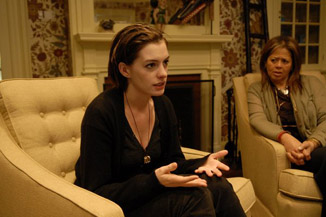|
|
Movie Review: Rachel Getting MarriedBy Matthew HuntleyOctober 8, 2008
Just days after Kym's release, her sister Rachel (Rosemarie DeWitt) will be marrying Sidney (Tunde Adebimpe), a black man who confesses he only ever wanted to listen to music, but now proclaims he only wants to listen to Rachel. Despite their happiness, Kym struggles to regain a sense of where she belongs in a family that pretends they don't look down on her. We understand Kym's frustrations - when she comes home, she can't find a quiet place to relax or be alone. The band is constantly rehearsing; the caterers are running every which way; her dad is always asking who's hungry; and Kym doesn't know anybody outside her immediate family members, except when she meets and has spontaneous sex with one of her fellow addicts (Mather Zickel). For Kym, it wasn't exactly the best time to leave rehab. With blunt observance and acute rawness, director Jonathan Demme (The Silence of the Lambs) captures the opposing dynamics of this tense familial gathering. His source is an original screenplay by Jenny Lumet (daughter of Sidney), whose writing is sincere and frank and almost completely free of artificial sentiment and manipulation. Through situations that are represented with sheer authenticity, we're slowly drawn into these peoples' lives and end up caring deeply for them. At every moment, there's a constant possibility that all hell will break loose (we anticipate it), and sometimes it does, but it feels real and doesn't exist merely to attract attention. Lumet's screenplay and Demme's direction are practical and unaffected by the rules of conventional Hollywood melodrama. Together, they dare us to pause, reflect, listen and wait for the conflict instead of succumbing to dramatic convenience or audience impatience. Consider the night of the rehearsal dinner when the film actually takes the time to go around the room to hear all the wedding attendees speak about the bride and groom. It's not just the main characters. With this strategy, we learn about the characters and they become more important to us, more tangible. I'll admit not all the dialogue seemed relevant, but how much of what we ever hear actually is? What's important is that we see the effect it has on Kym, who suffers because she's the only one among them not perpetually smiling.
|

|
|
|

|
Saturday, April 20, 2024
© 2024 Box Office Prophets, a division of One Of Us, Inc.


